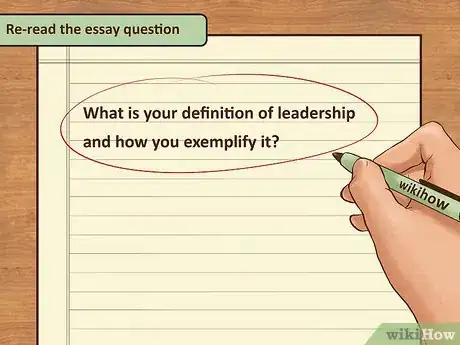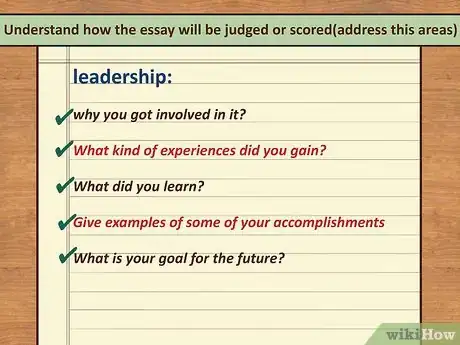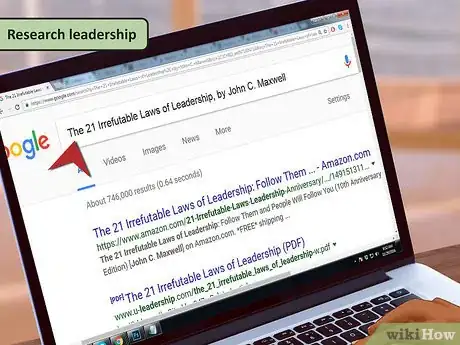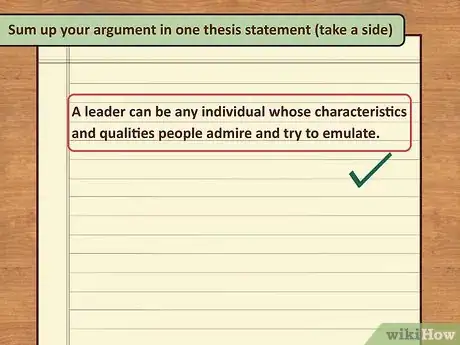This article was co-authored by Jake Adams. Jake Adams is an academic tutor and the owner of Simplifi EDU, a Santa Monica, California based online tutoring business offering learning resources and online tutors for academic subjects K-College, SAT & ACT prep, and college admissions applications. With over 14 years of professional tutoring experience, Jake is dedicated to providing his clients the very best online tutoring experience and access to a network of excellent undergraduate and graduate-level tutors from top colleges all over the nation. Jake holds a BS in International Business and Marketing from Pepperdine University.
There are 13 references cited in this article, which can be found at the bottom of the page.
wikiHow marks an article as reader-approved once it receives enough positive feedback. In this case, 100% of readers who voted found the article helpful, earning it our reader-approved status.
This article has been viewed 146,400 times.
A well-written scholarship essay is sometimes the most important element of an academic application. Scholarships to college or graduate school, as well as to other programs or opportunities, usually carry financial rewards and educational benefits. Many scholarship essays are on the subject of leadership. By creating an informative and persuasive essay on leadership, you may be able to win yourself a valuable scholarship that will enrich your future.
Steps
Defining Your Approach
-
1Re-read the essay question. Be sure that you are clear on exactly what the essay question is asking.
- Is it asking for your definition of leadership and how you exemplify it?
- Is it asking about leadership styles you admire?
- Is it asking specifically about leaders who you look up to?
- Is it asking about how you will grow as a leader at their institution?
-
2Identify your audience.[1] When crafting your essay, it is important to consider the type of school or institution to which you are applying. By keeping your audience (and scholarship selection committee) in mind, you will be more likely to impress them with your essay.
- Are you applying to medical school? If so, you may want to feature leaders in the medical field in your essay.
- If you’re applying to a religious institution, it would be a good idea to include at least one follower of that religion as an example of a good leader.
- Similarly, if you’re writing an essay for a service academy, you will want to feature military leaders in your essay.
Advertisement -
3Consider any themes covered in the essay question. Does the essay question specify themes such as innovation or nonprofit leadership? If so, be sure to focus on these, at least in part, in your essay.
-
4Understand how the essay will be judged or scored. What is the scholarship committee looking for or what are their criteria for judging your essay? By keeping these answers in mind, you will be able to craft an essay that meets their requirements and possibly wins you a scholarship.[2]
Understanding Leadership
-
1Research leadership. Simply put, leadership is the ability of someone to guide their peers towards a goal or an outcome. In order to write a scholarship essay on the subject, you need an even deeper understanding of the trait. Look for books, articles, and Web sites that focus on the concept of leadership.
- Web sites such as amazon.com and goodreads.com offer lists of leading titles on leadership.[3]
- Some classics in the field include The 21 Irrefutable Laws of Leadership, by John C. Maxwell; Good to Great, by Jim Collins; and Strengths Based Leadership, by Tom Rath and Barry Conchie.[4]
- A quick Internet search will provide you with countless articles on leadership, which will help you understand its core principles.
-
2Define leadership in your own terms. Now that you’ve researched the topic, think about what it means to you.
- Are you inspired by the ambition and risk-taking of good leaders? If so, focus on those in your essay.[5]
- Maybe you are more interested in the fact that good leaders are knowledgeable of their mission and have a strong vision of how to attain it. You can highlight these traits in your essay.[6]
- Don’t forget that good leaders also exhibit strong communication skills and are comfortable delegating duties to a dedicated team. Write about these characteristics in your essay as well.[7]
-
3Think about how you exhibit leadership in your life.[8] Most essays about leadership require you to reflect on ways you have demonstrated the trait in the past. By spending time brainstorming before you begin to write, you will make the writing process much easier.
- If you are not yet in the work force, think about how you may have demonstrated leadership abilities in sports and on academic or debate teams.
- Volunteer work and club memberships are other possibilities to consider when reflecting on your leadership experience.
- If you are in the work force, think of projects or teams you were on that gave you leadership experience.
- Some specific leadership traits you may be able to find in yourself include trustworthiness, reliability, and consistency.[9]
- Be specific when thinking about your own leadership experience. Think of specific goals or successes that resulted from your leadership.[10]
-
4Think outside the box when contemplating leadership. You don’t always need to be in charge of something to exhibit leadership. For children and young adults, leadership can be shown by helping people, making the right choices, and being independent.
- You may have shown leadership in your neighborhood by helping older neighbors with yard work or organizing games for kids after school.
- Another way you could have shown leadership is in your own family. Maybe you helped care for a younger sibling while your parents were working or taking care of an elderly relative, or you took on more responsibilities around the house during a difficult time.
- You may have demonstrated leadership at school. Did you confront a bully for a classmate? Did you help tutor a friend after school?
Writing the Essay
-
1Write an introduction that makes your audience want to read more. Your introductory paragraph should be three or four sentences that address what you will cover in the essay; in this case it would be leadership.
- A good way to grab interest in the introduction is to provide an anecdote from your life that shows leadership. You could write something like, “My leadership abilities were on display when I confronted a classmate who had been bullying a friend.”
- Alternatively, you could mention a great leader from history who has inspired you. It could be something like, “General Eisenhower showed great leadership when he gave the order to launch the D-Day invasion.”
-
2Sum up your argument in one thesis statement. Explain what it is about leadership that you will be writing about.
- Your thesis statement should appear in the introductory paragraph of your essay, usually as the last sentence.[11]
- If the application asks a direct question about leadership, you will need to answer it. That will form the basis of how you craft your thesis statement.
- A thesis statement should be debatable; you should take a side. An example would be, “A leader can be any individual whose characteristics and qualities people admire and try to emulate.”
- Some examples of strong thesis statements are: “The most important trait for a leader is ambition;” “All strong leaders are good communicators;” and “Every great leader has overcome failure in his or her life.”
- The rest of your essay should offer supporting evidence for the argument(s) you make in your thesis statement.[12]
-
3Write three paragraphs of body text. The body text should support the argument outlined in your thesis statement. Following your introductory paragraph with three paragraphs of body text, and then a conclusion, allows you to follow the classic format for a five-paragraph essay.
- Each paragraph of the body text section should contain a different argument/evidence that supports your thesis. The first body text paragraph should feature your strongest arguments.
- Each paragraph of body text should be between three and five sentences long.
- Throughout your body text, be sure to offer examples and anecdotes that boost your arguments. For instance, if your thesis is “ambition is the most important characteristic of leadership,” give examples of how you or strong leaders throughout history have embodied this trait.
- Use the information you gathered during your research when writing your body text.
- If the essay application defines different requirements for your essay, such as longer or shorter, follow those instead of the five-paragraph model.
-
4Write a strong conclusion. Your final paragraph is your last chance to convince your reader of your arguments.[13]
- Your conclusion should feature a re-phrasing of your thesis statement, as well as a summary of your supporting arguments.
- Finish your conclusion with a final thought on the topic.
- Do not introduce any new evidence in your conclusion.[14]
Finishing Touches
-
1Re-read your essay. Once your essay is written, step away for a few hours or, if you have time, a few days. Then, read it again with an eye toward whether it fulfills the application criteria and whether it needs any editing.
- Does your essay answer the question(s) posed clearly and comprehensively?
- Did you follow the format, style, or length requirements listed on the application?
- Did you make any typos or grammar errors that need to be fixed?
-
2Solicit feedback from a parent, teacher, or friend. It is always helpful to have another person read what you have written. They will look at your essay with fresh eyes and let you know if there is anything that should be added or fixed.[15]
-
3Remember the “intangibles” that make an essay great. In addition to answering the questions posed and meeting the requirements of the application, you can create a great essay by incorporating some characteristics of good writing.
- Active voice verbs are better than passive ones. Your text will be more compelling if you focus on this simple task.[16]
- Be concise. If you can say something in a sentence rather than a paragraph, write it that way.[17]
- Specific examples that support your viewpoint are better than general statements.[18]
- Make sure your essay really represents you and your thoughts. By maintaining your individuality throughout the writing process, you will be able to bring your own unique perspective to the essay, setting it apart from all of the others.[19]
Expert Q&A
-
QuestionWhat do you write in a leadership essay?
 Jake AdamsJake Adams is an academic tutor and the owner of Simplifi EDU, a Santa Monica, California based online tutoring business offering learning resources and online tutors for academic subjects K-College, SAT & ACT prep, and college admissions applications. With over 14 years of professional tutoring experience, Jake is dedicated to providing his clients the very best online tutoring experience and access to a network of excellent undergraduate and graduate-level tutors from top colleges all over the nation. Jake holds a BS in International Business and Marketing from Pepperdine University.
Jake AdamsJake Adams is an academic tutor and the owner of Simplifi EDU, a Santa Monica, California based online tutoring business offering learning resources and online tutors for academic subjects K-College, SAT & ACT prep, and college admissions applications. With over 14 years of professional tutoring experience, Jake is dedicated to providing his clients the very best online tutoring experience and access to a network of excellent undergraduate and graduate-level tutors from top colleges all over the nation. Jake holds a BS in International Business and Marketing from Pepperdine University.
Academic Tutor & Test Prep Specialist If you're writing about your own abilities, describe the ways in which you've showed strong leadership. This can be anything from completing a group project at school to starting a volunteer organization in your community.
If you're writing about your own abilities, describe the ways in which you've showed strong leadership. This can be anything from completing a group project at school to starting a volunteer organization in your community.
References
- ↑ Jake Adams. Academic Tutor & Test Prep Specialist. Expert Interview. 20 May 2020.
- ↑ http://www.topuniversities.com/student-info/scholarship-advice/how-write-winning-scholarship-essay
- ↑ https://www.goodreads.com/shelf/show/leadership
- ↑ http://www.inc.com/geoffrey-james/the-12-leadership-books-every-boss-should-read.html
- ↑ http://www.businessnewsdaily.com/2730-leadership.html
- ↑ https://www.entrepreneur.com/article/204248
- ↑ https://www.entrepreneur.com/article/204248
- ↑ Jake Adams. Academic Tutor & Test Prep Specialist. Expert Interview. 20 May 2020.
- ↑ http://www.beatthegmat.com/mba/2011/07/29/writing-about-leadership
- ↑ Jake Adams. Academic Tutor & Test Prep Specialist. Expert Interview. 20 May 2020.
- ↑ https://owl.english.purdue.edu/owl/resource/545/01/
- ↑ https://owl.english.purdue.edu/owl/resource/545/01/
- ↑ https://owl.english.purdue.edu/engagement/2/2/60/
- ↑ http://www.time4writing.com/writing-resources/writing-a-good-conclusion-paragraph/
- ↑ https://bigfuture.collegeboard.org/get-in/essays/8-tips-for-crafting-your-best-college-essay
- ↑ http://www.huffingtonpost.com/jeannie-borin/what-makes-a-great-colleg_b_4826945.html
- ↑ http://www.huffingtonpost.com/jeannie-borin/what-makes-a-great-colleg_b_4826945.html
- ↑ https://bigfuture.collegeboard.org/get-in/essays/8-tips-for-crafting-your-best-college-essay
- ↑ http://www.topuniversities.com/student-info/scholarship-advice/how-write-winning-scholarship-essay



































































